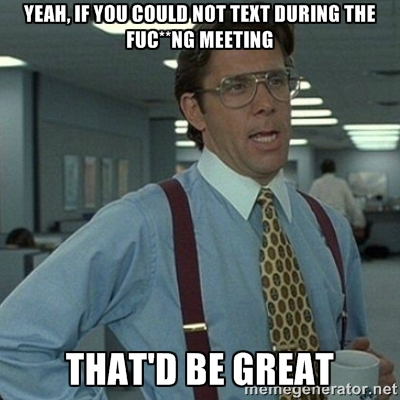Your digital marketing team is assembled and you’re ready to brainstorm that big new campaign direction. A guy at the table giggles. You think he has a good a idea. He doesn’t. He just got a funny text from his buddy.
OK, moving on. Someone blurts out a current event they just saw on Twitter while two others act focused on the meeting, but keep darting their eyes at their laptops every time no one is asking them a direct question.
Somebody types something. Is she taking notes? Sending an email? Live chit chatting on the Facebook?
Sound familiar? Are you that person?
Shut it all down. Turn it all off.
I know, I know… but you’re multitasking. BS… you’re distracted. Your attention is fragmented and your team is only getting a percentage of the focus they should be getting from you.
The one thing I’ve found most beneficial for conceptualizing new PR, social media, video and digital creative strategies for the brands and startups we work with is to shut everything down – computers, iphones, iPads, Androids and everything else digital – and free our minds.
Coming up with an effective digital marketing strategy is effectively problem solving. You’re starting with a goal and working backwards through objectives, tactics, and laying out a plan. You need everyone’s undivided focus and attention.
But we’re becoming so reliant on the tools we use, we’re forgetting how to use our minds without them. They’re becoming an extension of our consciousness.
How many people do you work with who shift attention to their mobile device every time it buzzes, pops, rings or vibrates?
You have to be focused on the problem and the solutions, not Googling campaigns your competition did responding to personal texts, email, the weekend weather and what your friends are up to on Facebook.
In our creative and strategy sessions at Supercool, we make everyone shut down unless they’re taking notes. There’s a fine line between multi-tasking and robbing your creative brainpower from solving problems.
Stop Googling everything. You can look stuff up later. Use your unplugged time to draw upon what’s already in your head, your experience, things you’ve done, seen, read and watched. You don’t need to look everything up right now, and at the very least you’ll get distracted by something else while you’re doing it.
Your mind has accumulated a lifetime of experiences, from childhood right through to that pop culture reference you picked up on Twitter this morning or that stellar campaign your competition just launched.
Try turning it all off for a few minutes, and let your mind go.







